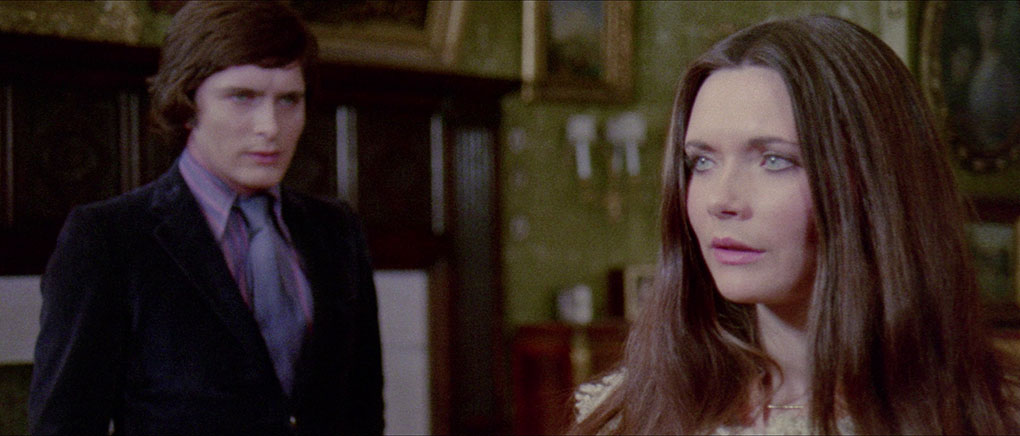|
My first encounter with the work of low-budget British horror specialist Norman J. Warren was probably also the reason I didn't seek out any of his other films. Herein lies a lesson about the importance of not judging any filmmaker on the basis a single feature. The film in question was his 1981 science fiction-horror Inseminoid, which I was initially drawn to by VHS rental cover artwork that I doubt would make it onto the shelves today. It featured the image of a naked woman with her legs spread being approached by an alien creature. It was framed at an angle that avoided testing Britain's obscenity laws, but was still creepily suggestive of inter-species sex and perhaps even alien rape. What drew me to it was a sort of "oh surely it can't be" disbelief that a post-video nasty release could contain such a scene, coupled with a perverse curiosity to see if it did. It did. Sort of. But the film itself had me giggling and groaning in equal measure. It's since developed a bit of a cult following, but it's safe to say that I wasn't a fan.
Thus the prospect of a box set full of films by the man who made Inseminoid – a set that also included Inseminoid – did not exactly thrill me. Having returned to reviewing after an expended break, however, it was deemed by those in editorial authority that I was the logical choice to cover this set, for no other reason than I've always been sympathetic to the pleasures of made-on-the-cheap horror. And the cinema of Norman J. Warren certainly qualifies. Hearing him talk on the commentary tracks in this set about the sometimes insanely low budgets he had to work with gave me a good deal of respect for him and his ability to deliver films that rarely look as cheap as they apparently were to make. Watching these films I began to wonder if Warren worked by finding a decent location to which he is granted access and then asked his scriptwriter to come up with a story that can make use of it. The special features confirm that this was never the case. Warren was just great at finding the required settings and getting access to them for free. That he liberally borrows from – or should that be is influenced by – a range of genre classics is something he's not always shy of admitting. To my surprise, this sometimes gives rise to far better movies than I had anticipated.

What comes across in spades in this set is that Warren is one of the nicest guys ever to stand behind a movie camera and that he loves what he does and enjoys talking about it. It's partly this that has enabled Indicator to gather such an insane number of special features for this release, but does also mean that there is some repetition, with some of the stories being told multiple times across several extras and even discs. And there's a huge amount to watch and listen to here. If you want to watch all five films and all of the extras in a box-set bash, I'd take a week off work and get a big supply of snacks. If I'd have been able to do this, I'm sure this review wouldn't have swallowed up all of my spare time for the past four weeks. The original plan was to do what we refer to here as a capsule review of each film (four paragraphs max, five if they're short) to save time and screen space, but I ended up treating each film and its associated special features as a stand-alone disc. Which in a sense they all are.
I'll admit now that I'm still in the process of finishing four of the reviews and have had to go back a re-watch them to refresh my memory and give each one the second (or third) chance it deserves. But the release date is upon us and we're starting to get a reputation for delivering reviews late, so we've decided that instead of holding off until I finish the whole thing, we'd post the review in single-film sections as each is completed. To that end, I will be finishing them off and posting them in chronological order, which means we kick off with…
You see this is what I meant when I said it's important to see more than one film by any director. I went in expecting little. I came out with a beaming smile on my face. Not because Satan's Slave is a cheerful film with an upbeat musical climax, but because it surprised the hell out of me and completely turned me around on the director who was later to give us Inseminoid. It even made me start looking forward to revisiting that film, but we'll get to that later. What surprised me the most about Satan's Slave, given that subtlety is not Inseminoid's star quality and that Satan's Slave is not the coyest of titles, is the level of restraint in both its handling and performances. The expected sudden bursts of violence and female nudity aside, it's a remarkably low-key affair that credits its audience with having the patience and intelligence not to see this as a failing. Because it isn't. No sir.

It begins with a satanic ritual in which a young woman is stripped nude, held down, has what sounds like an orgasmic experience and is then ritually killed, all under the direction of an unidentified man in robes wearing the sort of goat head mask that wouldn't have looked out of place in Hammer's The Devil Rides Out. The same goes for the opening titles, as it happens. Cut to a young man wining and dining a girl in a well-to-do house late one evening. She's tired from the drinking and it's late, so she accepts the young man's offer to stay the night. She clearly likes him and doesn't resist his kisses, but when he tries to force himself on her in the bedroom she loudly protests and fights the over-privileged bastard off. Good for her. He throws her clothes at her, tells her to leave and starts laughing, but as she opens the front door, her would-be rapist appears from nowhere and slams the door against her head. Just to make sure, the man then stabs his victim repeatedly with a knife, and is just surveying his work when a car pulls into the drive. Unsure what to do, he drags the mat on which the body has fallen across the floor. He doesn't get far, and when the door opens a woman enters, realises that there is blood on the door, turns to face the cowering figure and his victim and…
…and we cut to the next scene. Some will doubtless question the editing here, but I thought this was inspired. It's completely unexpected and leaves us with a host of questions we know won't be answered until later in the film. Some of them never are. Even after the film had concluded I was still smiling at the sheer creative balls of this edit.
We then meet two new characters in the shape of Catherine Yorke (Candace Glendenning) and her boyfriend John (Michael Craze) when they wake up in their glumly decorated London flat. Catherine's up early so that she can get ready for a trip to visit an uncle she didn't previously realise that she had. She'll be away for her birthday, which disappoints John, but he promises to take her out for a meal when she gets back (what a guy) and gives her a bracelet that once belonged to his mother as a present. I presume his mother died and he didn't just steal it from her. Some clunky exposition aside, this whole scene has a pleasingly naturalistic feel. Even Catherine's portentous revelation that she's been having premonitions is somehow painlessly shoehorned in. That, we can assume, will be important later. It's a similarly low-key story with Catherine's parents, Malcolm (James Bree) and Elizabeth (Celia Hewitt), with whom she is travelling. Both actors are clearly at ease in their roles and their exchanges have a nicely conversational authenticity. This was already feeling like a cut above the average micro-budget 70s British horror film.

The three drive to Uncle Alexander's in their Bentley, get lost on country roads (oh, I've been there), and just as they approach Alexander's isolated house, Malcolm is stricken with a sudden and agonising headache and crashes into a tree in Alexander's drive. Mother's okay, Malcolm assures his daughter (she's clearly dead) and urgently suggests that Catherine heads to the house to call an ambulance. She's halfway there when the car explodes. Alexander (Michael Gough) arrives to take care of the distraught Catherine, and with the assistance of his secretary Frances (Barbara Kellerman) and his adult son Stephen (Martin Potter), he calms her down (this is achieved with unconvincing speed, but I'll live with the shortcut) and gives her a couple of sedatives and a bed to rest in for the night.
If this sounds more like a drama than a horror film then there are a couple of things that I should probably mention. The first is that Stephen is instantly recognisable as the young man who murdered the girl at the start of the film, which raises instant concerns for Catherine's safety despite the seemingly real concern he expresses for his cousin's wellbeing. The second… well, the second one's tricky, and I'm tempted to suggest you hop ahead to the next paragraph if you don't know your British horror actors, as what seemed obvious to me may come as a surprise to some, and may well be intended as such. Michael Gough, you see, had one of the most distinctive voices in British cinema, and anyone familiar with his work will quickly realise that it's him behind the goat-head mask in the opening scene. But I'm not sure if we're meant to work that out or not. As a result, I'm also unsure whether we're supposed to believe at this point that Alexander really is a kindly old uncle with Catherine's best interests at heart or be aware that he's the head of a devilish cult that sacrifices young women and be fearful of his intentions towards his niece from the off. Personally, I lean towards the latter, as if director Warren had really wanted to disguise Gough's identity earlier, he probably wouldn't have had him say anything at all. Then again, I'm not in a position to say from a 2019 position how instantly recognisable Gough's voice would have been back in 1976. Answers on an electronic postcard please.
Either way, we know something's not right here and that Catherine's life is potentially in danger while cousin Stephen has his watchful eye on her. At one point he takes her to a spot in the woods where her gift for second sight prompts her to have a vision of an event from the distant past, one in which a women is stripped naked and then branded and whipped by the sort of dangerous religious nutballs who once claimed that women who spoke their minds were consorting with the Devil. And he leaves her there, heads back to the house and settles down with a good book. At this stage I was still uncertain what Stephen was up to. We know by now that he's been sleeping with Frances and that she's getting pissed off that he no longer seems interested in her. She's especially narked that he seems to now fancy Catherine. Is that why she steals a key from Alexander's keyring and goes digging the desk in his office for document that we never get to see? And it does start to look as if Stephen has a serious thing for his cousin, and even that she might be starting to fancy him.

Given that this was Warren's first horror feature, the fact that he doesn't feel the need to accelerate the pace and start throwing incidents at us every couple of minutes is a testament to his judgement, his directorial skills and his clear understanding of the workings of a genre he remains a fan of to this day. While the full extent of the mystery is most effectively kept under wraps until the time is right, the title and the opening sequence clue us in from the start to the fact that it involves the occult. And when the forces of darkness are harnessed here, the scenes are convincingly handled, notably when the effects of a destructive hex are made painfully clear through a combination of performance, camerawork and the disturbing abstractions of John Scott's atmospheric score. Here the film briefly did something that I've seen The Omen rightly credited for by making the theoretically absurd seem somehow plausible. That's how it becomes scary.
The film is nicely cast and the performances are far stronger than we've come to expect from low-budget horror. I'll give a special shout to Barbara Kellerman as Frances and particularly Michael Gough as Uncle Alexander, a man whose unspecified but subtly sinister intent hovers unsettlingly behind a mask of gentlemanly politeness. Some have unkindly suggested that Martin Potter is a little one-note as Stephen, but for me he nails the delivery and body language of someone who is wrestling inner demons, and at times he proved sympathetic enough for me to almost forget that he brutally murdered that poor girl at the start of the film. Almost. Indeed, there were moments when he starts really falling for Catherine when I was reminded a little of George Romero's Martin, whose title character's murderous impulses recede when he stops preying on women and starts having a fulfilling relationship with one instead.
Warren's command of pacing and blend of handheld camera, formally framed shots and smoothly executed tracks, coupled with cinematographer Les Young's moody lighting and John Scott's score, builds an atmosphere that owes as much to the British folk horror works of the day as it does to prime period Hammer. Yes, there is nudity and yes there is gore, but both are reasonably rationed and made to at least feel as if they are justified in narrative terms. The slow-build approach means that the most violent scenes don't come until later, but when they do, they deliver and include one that over 40 years after it was shot made me yelp and leap out of my seat in horror. The twists are well timed and we are more than once effectively wrong-footed, and the makeup effects bely the film's preposterously small budget. I'm happy to admit that I never expected to enjoy this film as much as I did. Nice one, Norman.
When you opt to play the film you're given the option to watch the original UK cut or the one prepared for international release. My review is based on the former, as this is the version that Warren prefers. There's actually only one difference between the two versions, and that's how the early scene where Stephen attempts to force himself on his female guest plays out. In the UK cut there's a struggle and some nudity and the girl breaks free.

In the export version the whole thing is more protracted and censor-baiting. Here Stephen suffocates the girl into unconsciousness with a pillow, then gags her, ties her down and cuts her clothes off with scissors, which he then runs over her body as if musing what injury to inflict on her. It gets worse. During the course of what amounts to a torture scene, he toys with the idea of cutting off one of her nipples, then runs the scissors down her body to, well, you can guess. It's then the girl breaks free. It's an unpleasant sequence that wanders into the seedier side of giallo cinema and came about after Warren was assured that it would bolster international sales (it did, apparently). I was somewhat relieved to hear that Warren himself dislikes this sequence and considers it distasteful and a bad fit for his film.
It's worth noting that the UK version of the film suffered a number of BBFC-imposed cuts, but the censored material has all been reinstated for this release. Hoorah.
Framed in is original aspecty ratio of 2.35:1, the 1080p transfer here is not without its issues, with the colour in particular often some way from naturalistic on artificially lit interior scenes, though exteriors and daylight lit interiors (when people are looking out of windows, for instance) tend to fare far better. At its best, the image is in very good shape, with nicely defined detail and well-balanced contrast, and while there is some slight flicker in places it's rarely distracting. On some darker scenes the shadows are strong enough to suck in a little detail, but this is never a big issue. The biggest casualty is the above-detailed scene in which Stephen attempts to sexually assault his guest – on his commentary, Warren reveals that he was only able to track down a single copy of the film that included the original British cut of that scene, and this displays some very visible damage. The longer export version is in far better shape.
The DTS-HD Master Audio 1.0 mono soundtrack has fared less well than the picture and contains a fair few pops and some background fluff. There's also a slightly crispy treble bias to the dialogue and sound effects, but there's never a problem following what anyone is saying.
There are, of course, optional English subtitles for the deaf and hearing impaired.
Audio Commentary with Norman J. Warren and David McGillivray
Director Norman J. Warren and screenwriter David MacGillivray make for entertainingly odd couple pairing here, with Warren's energetic enthusiasm amusingly offset by MacGillivray's air of world-weary cynicism. MacGillivray admits up front to not having seen the film since it was made, and reveals that it was on TV a few weeks previously and that "I watched the first ten minutes and then I couldn't bear any more." As it goes on, however, he warms to a film that he realises is better than he remembers and is repeatedly caught out by some of the stories Warren tells him about the shoot. Some of the topics covered are repeated elsewhere, but the casually conversational nature of the banter here makes it the best place to hear it all first, and there is plenty that is unique to this extra. I thoroughly enjoyed this. The two are reunited on the Terror disc.

Audio Commentary with Norman J. Warren and John Scott
In this second commentary, Warren is teamed with composer John Scott, and whilst Scott provides some useful information on the composition and recording of the score, much of what Warren has to say about the film is a rerun of his comments on the previous commentary or his interviews elsewhere in this set. Well worth a listen, but not as entertaining or revealing as the above.
Before the Blood (28:42)
The first part of an interview conducted specifically for this release with director Norman J. Warren focuses on his early life and career. As I said in my introduction, Warren is a hugely likeable and enthusiastic talker, and his recollections of how he fell in love with film and got started in the business are full of engaging anecdotes. My favourite involves how he landed an absolutely killer cast of future stars for his first feature, Carol, which tragically never got made – this alone would have made that a cult film. To my genuine astonishment, he was also one of the editors on William Burroughs' and Antony Balch's experimental works Towers Open Fire and The Cut-Ups, films that fellow reviewer Lord Summerisle has written about in considerable detail here. He also covers forming his own production company and making a glamour film for a client who liked the result but never came back for more.
All You Need is Blood (13:46)
Oh, this is a bit of a treat, a making-of featurette shot at the time of the film's production, but with newly added titles and captions (they're just too sharp and stable to have been optically added at the time). It includes footage of the shoot and interviews with the likes of screenwriter David McGillivray and actor Michael Gough, plus some narration from Warren, who introduces us to some of the crew. Lots on makeup and makeup effects here.
All You Need is Blood Outtakes (32:42)
A slightly misleading title, as this is not so much outtakes – much of the footage here is included in the featurette – as the raw footage from which the above was created. There's some interesting stuff here, my favourite being the shot of a barebones crew filming the tail end of a deadly dive from a tower block whilst a woman pushing a pram stops close to them to presumably wonder what the hell is going on.

Creating Satan (30:14)
A making-of featurette shot for what looks like an earlier Anchor Bay DVD, this is another welcome inclusion. It's built around interviews with producer-cinematographer Les Young, director Norman J. Warren, writer David MacGillivray and actor Martin Potter, who all have engaging recollections of the funding, making and distribution of the film, some of which is repeated elsewhere in this disc but often from a different perspective. There are also contributions from associate producer Moira Young on being pushed by her husband to take the place of an absent actress who was due to play the nude sacrificial victim in the opening scene, and film sales and distribution man Ken Dowling on the film's double-bill teaming with Curtis Harrington's Ruby.
Devilish Music (13:05)
In what also looks like an extra from the Anchor Bay DVD, composer John Scott talks about his early friendship with Norman J. Warren and provides some interesting specifics of composing and performing the score on a budget that only allowed for 7 musicians. Particularly engaging are the stories of how he and his colleagues collaborated and how they used experimentation to cover up for the instruments they lacked.
Deleted Scenes
The two edited sequences here are both lacking a soundtrack (the magnetic tapes have disintegrated) and are both from the monochrome work print used to edit the film – colour work prints were too expensive back then for a low-budget production such as this. On Dream Sequence (2:12) Warren's brief intro gives way to score music. Tea Party (3:05) includes some information from Warren on why the sequence was shot and why it was eventually cut, then plays out in silence. Since this is a dialogue-heavy scene (one of the reasons it was cut in the first place), there's not much to hold you after Warren has said his piece.

Censoring 'Satan's Slave' (15:51)
A really useful run-though of the cuts to the film requested by the BBFC in order to get it an X certificate. Each scene is shown first in its X certificate version, then run side-by-side (or whatever its vertical equivalent is called) with the uncut version for comparison. You should steer clear of this before watching the film for the first time to avoid spoilers – even listing the scenes in question would give the game away.
Trailers
Two theatrical trailers have been included. The 'U' Theatrical Trailer (2:08) is a ramshackle affair in which the music comes and goes in a heartbeat and that includes some spoilers if you're paying attention. The 'R' Theatrical Trailer (3:10) is essentially the same, but with added nudity and violence and a lot more spoilers, including the bloody ending!
Image Gallery
56 slides of promotional stills, press book pages, posters and video covers. Some nudity, some violence and some spoilers.
Prey | Terror | Inseminoid | Bloody New Year | next >
|